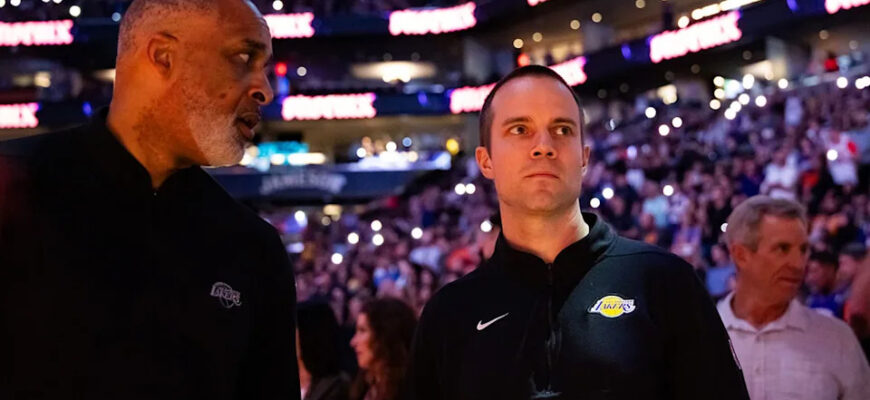The NBA`s coaching carousel has spun once more in Phoenix, depositing Jordan Ott into the high-stakes, high-pressure role of head coach for the Suns. While Ott arrives with a commendable resume, having contributed to the Cleveland Cavaliers` impressive 64-win season, he inherits a franchise defined by its recent volatility and a roster perpetually teetering on the edge of a significant overhaul. The question isn`t just about Ott`s coaching philosophy, but whether he can navigate the intricate web of player dynamics and front-office expectations that have proven to be a short fuse for his predecessors.
A New Face in a Familiar Hot Seat
Jordan Ott`s journey to the Phoenix Suns` top coaching spot is a testament to diligent progression through the NBA ranks. His recent tenure as an assistant with the Cavaliers, following stints with the Lakers and Nets, and even an earlier role as a video coordinator for the Atlanta Hawks, demonstrates a comprehensive understanding of the game from multiple perspectives. This foundational experience, particularly his contribution to the Cavaliers` success, undoubtedly caught the eye of the Suns` management.
Notably, Ott secured a crucial “stamp of approval” from franchise cornerstone Devin Booker, suggesting a deliberate effort by the Suns to ensure alignment with their star player. This involvement from Booker underscores the team`s commitment to building around the All-Star guard, a strategy that, ironically, has coexisted with an alarming rate of coaching changes.
A curious detail that might offer Ott a sliver of job security (or at least, a longer leash) is his connection to Suns owner Mat Ishbia. Both are Michigan State alumni, and Ott even served under legendary Spartans coach Tom Izzo as a video coordinator. In the often-impersonal world of professional sports, shared alma maters sometimes translate into a deeper rapport, perhaps granting Ott more time than the recent occupants of the Suns` coaching chair.
The Suns` Revolving Door: A Cautionary Tale
For Ott, history is not just a subject for reflection; it`s a stark warning. The Phoenix Suns have developed a reputation for coaching instability, churning through three head coaches in as many years. Mike Budenholzer, Frank Vogel, and Monty Williams – a coach who led the team to the NBA Finals – all found themselves exiting prematurely, often after just a single season. This trend paints a picture of immense internal pressure and potentially unrealistic expectations from the front office.
- Monty Williams: Fired after leading the team to the NBA Finals and making the postseason in three of his four years.
- Frank Vogel: Dismissed after one season, following a first-round playoff exit.
- Mike Budenholzer: Let go after his first season, despite a promising start, as the team missed the playoffs.
This rapid turnover suggests that success, even significant success, offers little guarantee of longevity in Phoenix. Ott steps into an environment where the margin for error appears razor-thin, and the definition of a “competitive team” is a moving target.
The Kevin Durant Conundrum: A Looming Trade Cloud
Beyond the immediate coaching challenge, Ott`s tenure begins under the formidable shadow of Kevin Durant`s uncertain future. Durant, a future Hall of Famer, remains a central figure in incessant trade rumors. Reports suggest his name was heavily discussed at the last trade deadline, with potential mutual interest with teams like the San Antonio Spurs and Minnesota Timberwolves, not to mention Durant`s personal veto of a return to the Golden State Warriors.
The Suns` initial asking price for Durant was understandably high, reflecting the significant assets (four unprotected first-round picks, one unprotected pick swap, Mikal Bridges, Cam Johnson, and Jae Crowder) they surrendered to acquire him. However, with Durant now 37 years old and entering the final year of a contract that owes him $54.7 million before he becomes a free agent in 2026, the market dynamics have shifted considerably. The Suns have reportedly lowered their asking price, making a summer trade a much more plausible scenario.
This situation presents a strategic tightrope walk. Trading Durant means potentially recouping valuable assets – be it younger talent, draft picks, or salary relief – that could be used to retool the roster around Devin Booker. Yet, it also means losing a generational talent, even an aging one, whose presence elevates the team`s ceiling. The outcome of this high-stakes negotiation will significantly shape the team Ott is tasked with coaching, and indeed, his immediate prospects in Phoenix.
Building Around Booker: Retool, Not Rebuild
The consistent thread through the Suns` recent decision-making, from coaching searches to potential trades, is the unwavering commitment to building a championship-caliber team around Devin Booker. This signals a clear “retool, not rebuild” philosophy. While a Durant trade might net draft capital, the expectation remains that any incoming assets will be immediate contributors, designed to keep the Suns competitive and vying for a playoff spot.
Jordan Ott`s task, therefore, is not merely to coach a basketball team; it is to manage a complex ecosystem of high expectations, roster fluidity, and the ever-present specter of past coaching failures. He must integrate new players, develop existing talent, and forge a cohesive unit capable of winning in the demanding Western Conference, all while the front office juggles the ultimate fate of one of the game`s biggest stars. It`s a role that demands not just tactical brilliance, but also a remarkable degree of resilience and perhaps, a touch of diplomatic finesse. Only time will tell if Ott can navigate these turbulent waters and bring a much-needed era of stability to the Valley of the Sun.








